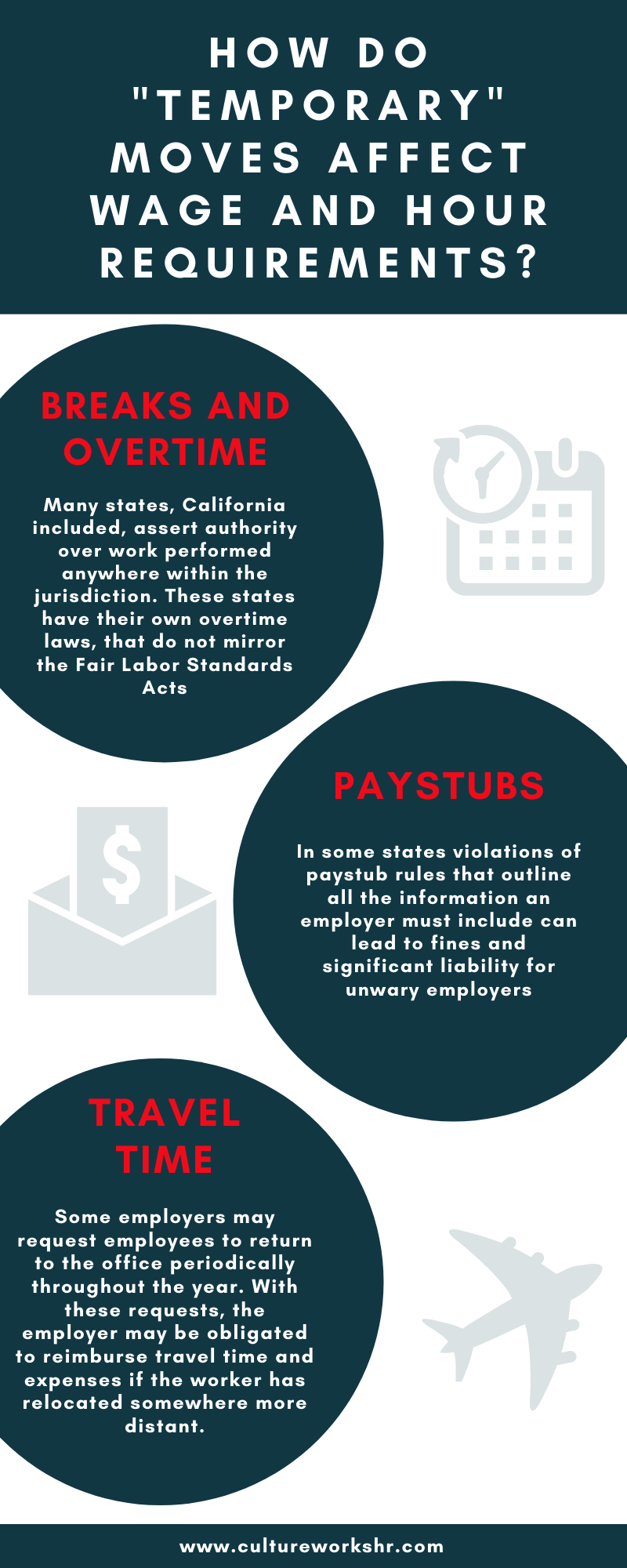Wage and hour issues with a remote workforce
As we approach nearly a year of COVID-related closures and employees working remotely, it’s safe to say that this may be the new reality. Twitter, Square, and Facebook have all adopted an indefinite work from home policy, while other major companies have pushed their reopening to later in 2021. As most employers have discovered this year, employees can still perform their job functions effectively when working remotely.
In fact, according to the State and Work Productivity Report, 65% of employees believe that working remotely would increase productivity- and their bosses agree!
With this major shift in the usage of the physical office, employers need to be aware of the potential liability remote work holds. Specifically, wage and hour compliance with both exempt and nonexempt employees.
What’s the difference between exempt and nonexempt employees?
Exempt employees are employees who are not entitled to overtime pay, regardless of the number of hours worked in a day or week. Non-exempt employees, however, are entitled to overtime pay if the employee works more than eight hours a day, or forty hours a week (depending on the state).
Timekeeping practices and “off the clock” work for non-exempt employees.
One of the most prevalent concerns for employers with non-exempt employees working remotely is timekeeping. In a pre-COVID world, many employers never had to worry about non-exempt employees’ timekeeping, as when they were in the office, they were working. As these employees continue to work remotely, it’s important to revisit your timekeeping practice requirements, if you haven’t already!
A few steps you can take to minimize your risk and continue to adapt to the ever-changing workplace environment are as follows:
Reiterate Timekeeping Practices
If you haven’t already, ensure you reiterate timekeeping practices in writing to all employees. This should have a clear indication that timekeeping will be enforced to the same extent as when employees are working in the office. It’s important to note, that if a non-exempt employee is working outside his/her working hours, it needs to be addressed promptly!
Ensure you communicate with management and supervisor-level employees.
It’s important that managers and supervisors understand that they cannot communicate with non-exempt employees outside of their set schedules. Clear boundaries must be in place to ensure your non-exempt employees don’t need additional pay or claim they were not paid for time worked.
Update all timekeeping systems and ask employees to certify their time worked
Due to employees working at home, some timekeeping systems may need to be updated or revised. New protocols may also need to be put into place, such a reporting and certifying their time worked. Employees should be asked to record their time each day, report it to their supervisor, and certify that the amount recorded is accurate and illustrates their time worked. Should questions or claims arise regarding overtime, this record will be helpful.
Make sure your telecommuting policy is solid.
Consider creating, or revising an existing telecommuting policy to reflect your expectations around remote work. This policy should include expected hours, rest and lunch breaks, timekeeping procedures, and communication with managers procedures and protocols.
With this policy in place, it’s important not to forget meal and rest breaks must be provided and enforced in the manner they were in the office. These requirements may vary depending on the state, so ensure your state-specific guidelines are being followed.
Be aware of potential expenses incurred when working remotely.
Employers who require employees to pay or reimburse the employer for items that are business expenses could lead to a reduction of the employee’s earnings, below the required minimum wage, or overtime compensation rate. Employer’s also may not require employees to pay or reimburse the employer for items provided to a qualified individual with a disability as a reasonable accommodation while telecommuting. States, like California, require employers to reimburse employees for reasonable and necessary business expenses, so it is important to be aware of your state-specific requirements to ensure compliance.
How have “temporary” moves affected these regulations?
While the typical remote work hurdles still apply in regard to wage and hour compliance, the government mandates and public health concerns bring about a different aspect of compliance that may be of concern. Some employees have relocated during the global pandemic to areas of lower risk of infection. These “temporary” moves may cause the employer to become subject to the complexities of multi-state employment, which presents even more challenges.
Breaks and Overtime
Many states, California included, assert authority over work performed anywhere within the jurisdiction. These states have their own overtime laws that do not mirror the Fair Labor Standards Acts, so if any employee moves to one of these states new overtime requirements may be necessary.
Similarly, an employer may fail to provide or keep a record of the specific meal and rest breaks required by the statutes where an employee has undertaken remote work.
Paystubs
In some states violations of paystub rules that outline all the information an employer must include can lead to fines and significant liability for unwary employers. It’s important to understand state-by-state the paystub rules and regulations to avoid noncompliance.
Travel time
Some employers may request employees to return to the office periodically throughout the year. With these requests, the employer may be obligated to reimburse travel time and expenses if the worker has relocated somewhere more distant. As an employer, it’s important to ensure your policies surrounding travel time are clear and communicated.
As an employer working to navigate the new reality of remote work, it’s important to be aware of potential issues that may arise due to the changes. As you begin to rethink your workforce, and how to proceed into the next few years, consider bringing on a team of Culture Operations specialists to ensure your company culture, and HR compliance remains intact with the various changes.












